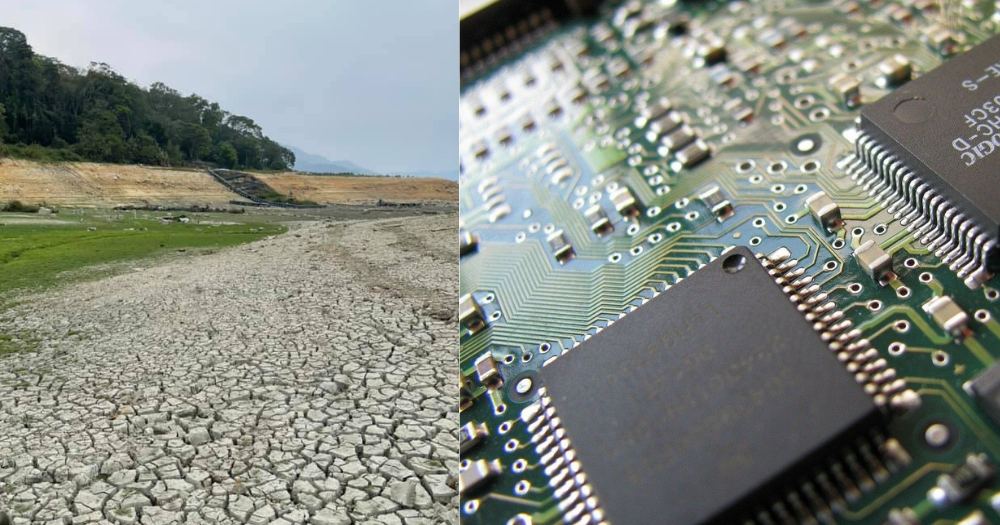Follow us on Telegram for the latest updates: https://t.me/mothershipsg
Taiwan is experiencing an extended dry season which has lasted for many months.
This is its worst drought in 56 years after the island was not struck by any typhoon in 2020 and experienced sparse rainfall.
The lack of rainfall also has a more far-reaching impact than one might imagine — the global chip supply.
Global chip shortage
Taiwan is the main supplier for semiconductors, also known as "chips", globally. More than 60 per cent of the total global foundry revenue goes to contract manufacturers in Taiwan, CNBC reported.
Taiwan Semiconductor Manufacturing Co (TSMC) is the world's largest contracted chipmaker and their prominent clients include tech companies like Apple and Qualcomm.
With more people stuck at home, there is a surge in demand for electronic gadgets. This in turn drives the demand for chips which are required to power electrical products such as smart phones, computers, game consoles and cars.
The trade war between China and the U.S. has also caused disruption to the chipmaking industry.
Then came the extended drought in Taiwan, which can worsen the global chip crunch as it takes a lot of water to produce chips.
This could also mean that electronic gadgets and cars might become more pricey for all of us.
The executive director of the consultancy Strategy Analytics, Neil Mawston, told Agence France-Presse earlier this year:
"Anything with a chip is affected - cars, smartphones, game consoles, tablets and laptops. Electronic gadgets and cars will be in shorter supply or more expensive throughout 2021."
Taiwan chipmakers holding up amid drought
Chips production is a water-intensive process as a lot of water is required to rinse the wafers, a type of thin sliced chips.
To give you a better idea on how water-intensive it is to create chips: TSMC uses 156,000 tonnes of water each day in their production, according to AFP.
As the pillar of Taiwan's economy, the government of Taiwan has prioritised the semiconductor companies over other sectors during the drought. This has caused some unhappiness among some farmers who were forced to abandon their fields.
"...You can give us water for two days a week or one day. Farmers will find a way. But now they've completely cut our water, farmers can't find a way out. You're focusing entirely on semiconductors," a farmer in Hsinzhu told BBC.
Without any sign of heavy rain, more than a million households and businesses in Taiwan have been rationing water since April. Chipmakers also had their water supply cut off by 15 per cent as water levels at two major dams in Taichung were only at five per cent of their capacity.
In response, TSMC has resorted to reusing water in their production and mobilised water trucks to deliver water to its facilities from other reservoirs in Taiwan.
It was reported on Apr. 21 that TSMC assured that its production has not been affected by the drought, yet.
Taiwan's president Tsai Ing-Wen said in late April that the drought situation has reached a "critical phase" and urged for more water conservation, Nikkei Asia reported.
The island is now waiting for the seasonal plum rains to arrive. Local media reported that there could be heavy rains in end-May.
Climate change?
Most of Taiwan's water comes from seasonal typhoons and storms.
The island typically receives an average of three to four typhoons a year but this has fell to 2.5 in recent years. However, in 2020, Taiwan saw no typhoons, a first in more than half a century.
To further compound the problem, the annual number of rainy days has also decreased significantly since 1960s.
This dire situation that Taiwan is facing now can possibly happen again due to climate change.
A climate researcher at Academia Sinica, Hsu Huang-hsiung, commented that this drought is "a good lesson and a revelation for Taiwanese to foresee how much worse the situation might be in the foreseeable future".
Studies have suggested that global warming will result in "fewer but stronger typhoons, drier spring, fewer rainy days, and stronger precipitation". The world will also experience a significant increase in temperature and severe heat waves, Hsu cautioned.
He urged people and the government to take climate change seriously and take necessary actions to mitigate risks.
Related story:
Top image via Jacy Chen/Facebook and by Republica via Pixabay
If you like what you read, follow us on Facebook, Instagram, Twitter and Telegram to get the latest updates.

